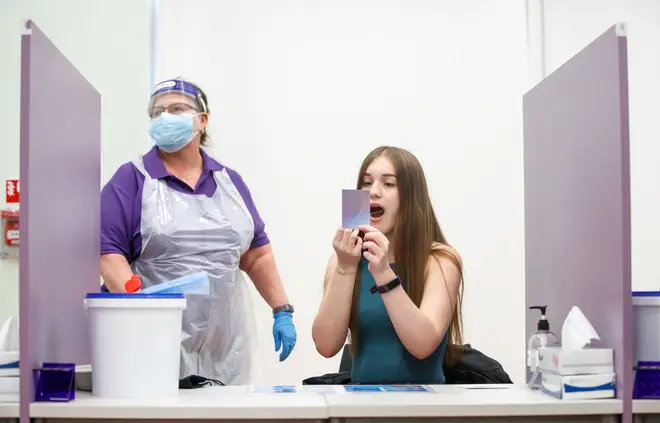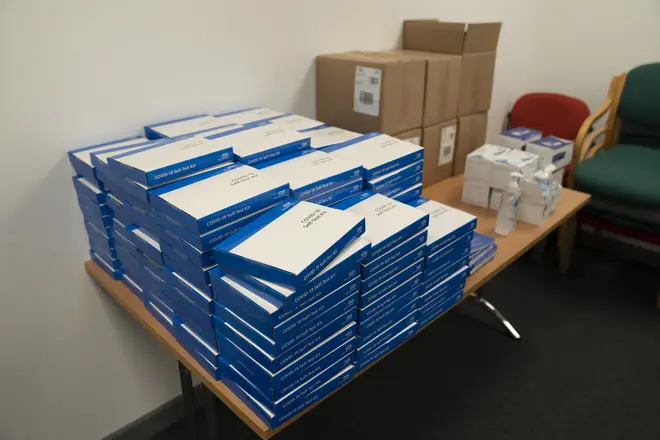
Ben Kentish 10pm - 1am
7 March 2021, 07:04 | Updated: 8 March 2021, 06:19

Gavin Williamson: Children could submit false results for admission
The government is set to roll out the "largest testing regime" of the pandemic so far, the education secretary has told LBC, with pupils returning to secondary schools in England from Monday asked to take multiple Covid tests per week.
Secondary school and college students will be asked to take three lateral flow tests on site in the first two weeks and then will be given home testing kits to test themselves twice a week for the foreseeable future.
Ahead of the return to classrooms on Monday, Education Secretary Gavin Williamson told LBC's Swarbrick on Sunday this will be “the largest testing regime that we have seen rolled out in this country", adding "it is a very significant one".
Read more: Government has a 'moral duty' to give NHS staff more than 1% pay rise, Lisa Nandy says
However, Mr Williamson conceded it "is feasible" that students could upload false home test results to the NHS Track and Trace app, although he added this is unlikely to happen as pupils "care... about those who they are working with".
It comes as the prime minister has vowed to remain "cautious" in loosening restrictions, warning we must be careful not to "undo the progress we have made", despite the "truly national effort" to reduce cases.

In the first step out of lockdown, all pupils in England will return on Monday, with those in secondary school and colleges asked to wear face coverings in class for the first time.
Nearly 57 million lateral flow test kits, which can produce results in less than 30 minutes, have already been delivered to schools and colleges as part of the rollout of asymptomatic testing, Downing Street said.
While some primary schools are testing their pupils, the education secretary told LBC "we are not in a position where we will be rolling out home testing kits for primary school children".
Mr Williamson added: "We have already rolled out full workforce testing in primary schools, teachers, teaching assistants and other support staff are able to test themselves at home. There has already been an incredibly high take-up of this."

Test and Trace adviser explains plans to allow children back to school
Although the new testing regime is a significant step up from the situation before Christmas, there are concerns that many students will still be forced to self-isolate repeatedly if they come into contact with classmates who test positive.
The new variant means plans for regular testing of close contacts, to allow pupils to stay in school even after coming into contact with a positive classmate, have been put on hold, Mr Williamson told LBC.
"We are having to do more trials on that in order to ensure that approach continues to work and we are doing that with the MHRA, the medical regulator. Once we have done that, depending on the results, we would like to be able to look at different options. But we are just not in the position to do that sadly.”
Professor Sheila Bird, a member of the Royal Statistical Society, has also warned it will be "very likely" that the lateral flow tests will produce false positives and that all positive results should be double-checked with a more accurate PRC test.
Read more: Students fear 'no tolerance' approach to marking on return to school, reveals leader

Pressed by LBC's Tom Swarbrick on whether the home testing of students could allow students to "upload a false result in order to get into school", Mr Williamson conceded "that is feasible".
"I think you will find children are much more responsible than yourself and wouldn’t be uploading false responses," he responded.
"That is feasible, but you know, what we are doing, we are also asking schools to have testing centres remain on site.
"So if there is particular concern about a child, that they have not been able to do the testing properly or they haven’t been able to have the support at [home] in order to do the testing, then the child will be able to go to school, ask to do the test under supervision and be able to do that."

Iain Dale asks did students go back too quickly leading to Covid spike
While Boris Johnson has said he will remain "cautious" in loosening lockdown rules, Monday marks the first step towards normality and with the accelerating vaccine program the PM is likely to face increasing calls to bring forward his roadmap.
Across the whole of the UK, more than a million people have received both doses of a Covid-19 vaccine, while almost 21.8 million people have had one dose.
Read more: Government urged to make U-turn over 'unacceptable' 1% NHS pay rise as backlash grows
Hundreds of thousands of letters for those aged 56 to 59 age group began landing on doorsteps on Saturday, after eight in 10 people aged 65-69 took up the offer of a jab, NHS England said.

Matt Hancock: Two in five adults have had Covid-19 vaccine
According to the prime minister's road map, the second part of stage one, which will allow outdoor gatherings of either six people or two households, is due on March 29.
Shops could open by April 12 and all restrictions could possibly be lifted by June 21.
"We are being cautious in our approach so that we do not undo the progress we have made so far and I urge you all not to give up on your efforts to keep your families and others safe," Mr Johnson added.
"Get the vaccine, get tested, and remember that we are all in this together."

Burnham: U-turn on NHS pay, propose 'proper deal' and bonus
The renewed push for people to continue to obey the rules comes after Health Secretary Matt Hancock shared data on Friday showing the average daily number of Covid cases, hospital admissions and deaths are the lowest they have been since autumn.
On Saturday, the government confirmed a further 158 people had died within 28 days of testing positive for Covid-19 and that, as of 9am, there had been a further 6,040 lab-confirmed cases in the UK.
Mr Hancock said the falling cases meant the government could continue with its plan of replacing the lockdown with the "protection that comes from vaccines and regular testing".